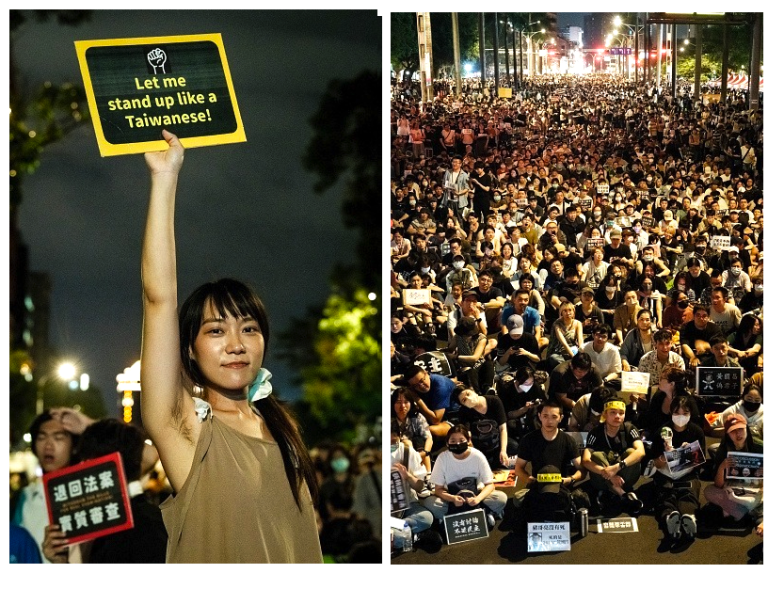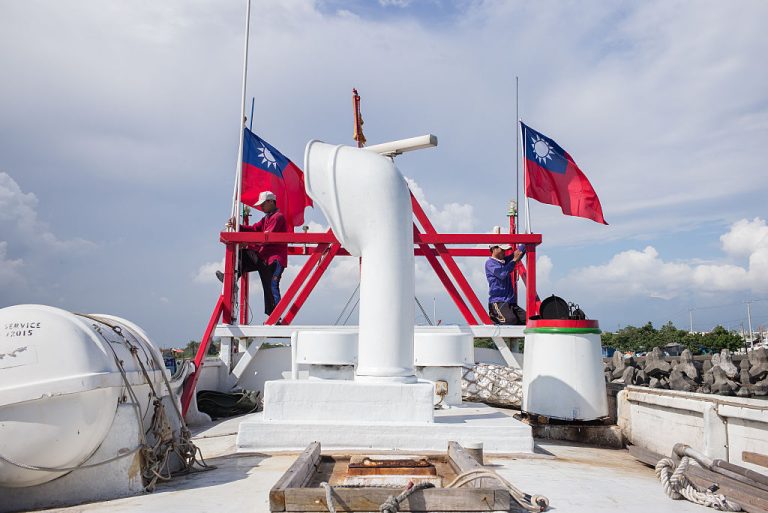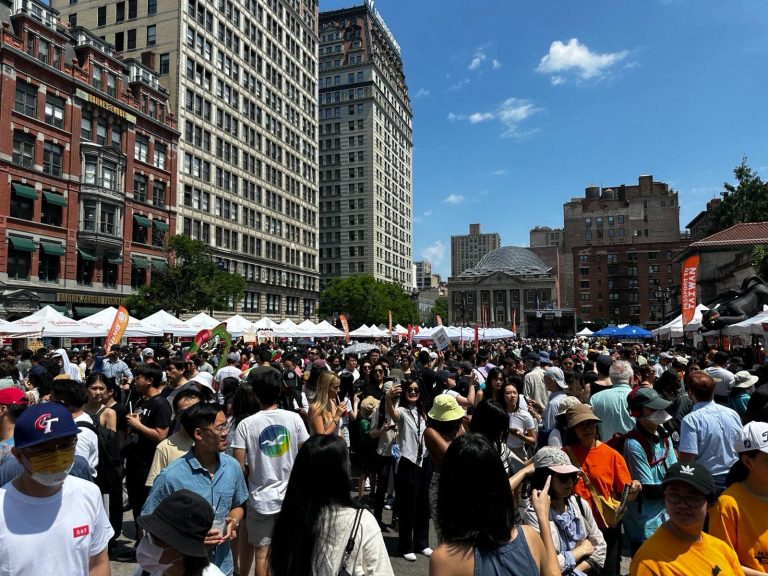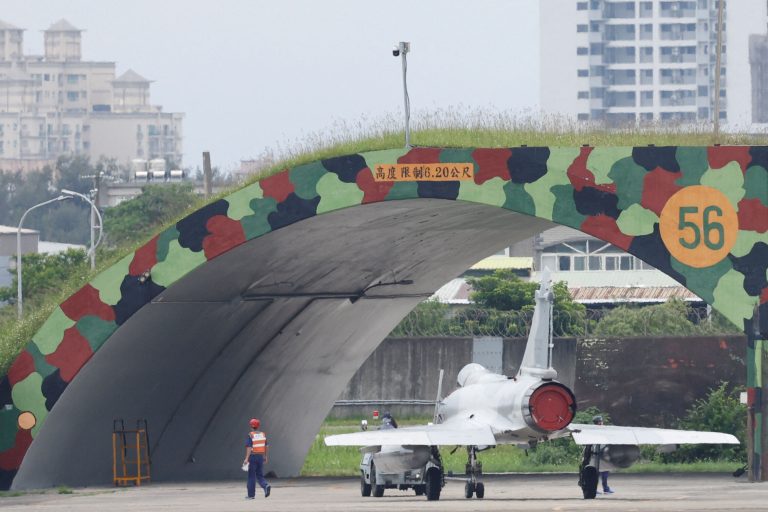On May 24 and May 28, protests of 30,000 and then 100,000 people gathered around Taiwan’s Legislative Yuan to demonstrate against controversial parliamentary reforms that many fear could help tip the island’s democratic system in favor of Communist China.
Taiwan’s newly inaugurated president Lai Ching-te, who won election this January, is a staunch critic of Beijing. The Chinese Communist Party (CCP) sees Taiwan as a renegade province, to be “recovered” by any means necessary.
While the communist People’s Liberation Army (PLA) carried out large-scale exercises around Taiwan starting May 23 as “punishment” for Lai’s inauguration, Taiwan’s opposition parties stepped up their own moves on the legislative front.
- Communist China Aims for ‘Total Subversion’ of Taiwan Following Presidential Election, Insider Yuan Hongbing Warns
- Quality, Safety Concerns of Chinese-made EVs Come to the Fore
- ‘No Concessions on Democracy and Freedom’: Taiwan’s New President Tells Beijing
In the week leading up to Lai’s inauguration on May 20, the “blue-white” coalition, consisting of the Kuomintang (KMT) and the Taiwan People’s Party (TPP), leveraged their collective majority in the Legislative Yuan to advance measures that would give lawmakers more oversight over the government.
Lai and his party, the Democratic Progressive Party (DPP), advocates a separate identity from China, in contrast with the KMT’s conciliatory stance towards Beijing in recent decades.
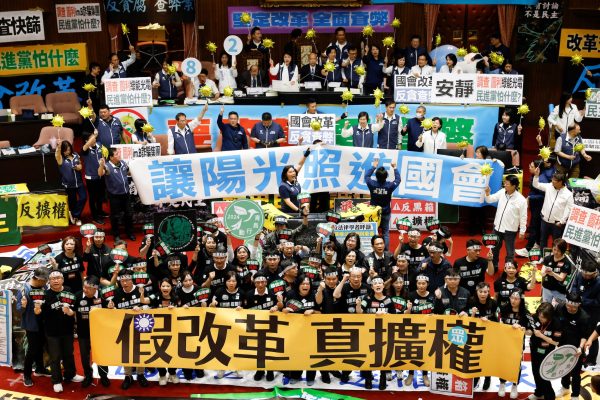
Success
You are now signed up for our newsletter
Success
Check your email to complete sign up
Taiwan is officially governed as the Republic of China (ROC), which relocated to the island in 1949 after the ROC authorities, then led by the KMT, were defeated on mainland China by the communist forces.
On May 28, more bills were given readings, and by the evening, around 100,000 people had gathered to protest outside the Legislative Yuan.
Slippery slope?
Originally proposed by the “blue-white coalition” in March, the parliamentary reform bills would give greater powers to lawmakers to investigate, sanction, and demand information from the executive branch, businesses, and the military.
Perhaps most controversially, the proposed legislation could have government officials fined or jailed under the vaguely worded new criminal offense of “contempt of parliament” if they were found to have made false statements to the legislature.
- Trump Will Continue Support for Taiwan if He Becomes President, Ex-Ambassador Says
- Passport to Taiwan, New York’s Largest Asian American Festival, Celebrates Two Decades of Festivities
- Chinese Coast Guard Ships Damaged Philippine Vessels With Water Cannons, Officials Say
The DPP argues there is no clear definition of “contempt of parliament.”
During the protests on May 24, people listened to speeches and carried banners accusing the opposition of trying to ram through the reforms, and of working in concert with Communist China. People from all segments of society were present at the gathering, which predominantly featured Taiwanese youth.
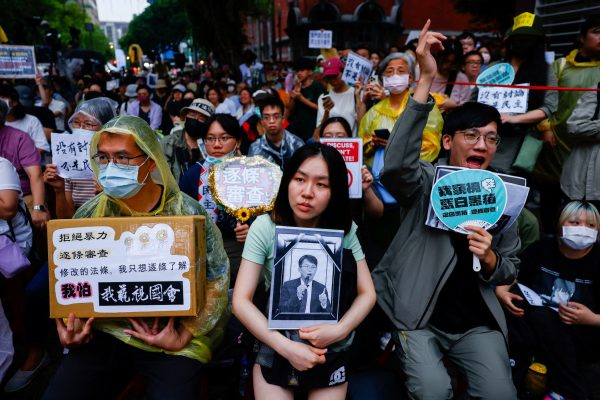
Another aspect of the proposed reforms is the powers it would give lawmakers to demand access to classified documents from the Taiwan presidency.
Given the ties various lawmakers have with the CCP, such privileges could greatly increase the risk of Taiwan’s state secrets falling into Beijing’s hands.
While the blue-white coalition controls a majority in the Legislative Yuan, the reforms are not a done deal even if passed. Lai’s cabinet will send the bills back to the parliament, delaying the process by weeks or more.
Meanwhile, DPP lawmakers will ask Taiwan’s constitutional court for an interpretation on whether the laws and the way the reforms were pushed through were in line with the supreme law of the ROC.
In a third, more extreme option, DPP legislators could file a no-confidence motion against their own premier, and the outgoing premier could in turn ask the president to dismiss the legislature.
‘Seize the commanding heights’
In February, exiled Chinese dissident and jurist Yuan Hongbing warned that following the election of Lai Ching-te this January, the CCP would focus its attention to influencing Taiwan via the Legislative Yuan.
- On National Fentanyl Awareness Day, DEA Head Highlights Role of Chinese Producers in Opioids Reaching America
- South Korea’s President Yoon and Ruling Party Suffer Legislative Election Loss in Setback for Anti-Communist Politics
Yuan, who resides in Australia and has extensive contacts within the Communist Party regime, told Vision Times at the time of how, according to his sources, CCP leader Xi Jinping had specifically given instructions to work with Taiwan’s opposition lawmakers to “seize the commanding heights of the Legislative Yuan.”
This would facilitate the “peaceful reunification” of Taiwan with Communist China, Yuan said.
The KMT has accused the DPP of trying to “spread rumors and paint them red”, the color of the mainland communist regime. “The DPP is hindering parliament reform as it is afraid that there will be no place to hide malpractice and lies,” it said in a statement.
Protest-goers did not seem to be convinced.
“Are they becoming the Chinese Communist Party’s spokespeople in Taiwan, trying to erode our democracy?” said homemaker Mucha Kung, referring to the blue-white opposition politicians.
“I think China is the one that needs reform. Why do they have to meddle with us when they themselves do not have a democratic system?” said retiree Fong Jye-mei, 66.
Reuters contributed to this report.



